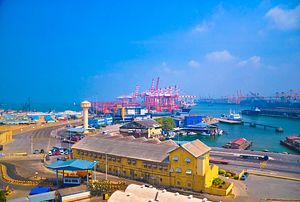The effect of Chinese outward investment (COI) on host country corruption levels, government accountability, and transparency has been a topic of considerable interest among activists and scholars as well as businesspeople and policymakers who fret Chinese malfeasance is putting their firms at a competitive disadvantage. This makes sense given billions of dollars of Chinese investment in countries such as Angola, Sudan, and Venezuela, which fare quite poorly in the pertinent international rankings. Moreover, there are numerous reports of Chinese companies paying bribes to secure a major port deal in Sri Lanka, to try to obtain a major broadband telecommunications deal in the Philippines, and to secure lucrative oil and gas opportunities in Kazakhstan. Beyond this, Transparency International’s 2011 Bribe Payer Index ranks Chinese companies second out of a list of 28 countries in terms of their willingness to pay bribes. Indeed, one set of writers from Pacific Forum CSIS has accused China of hypocrisy, waging a vigorous fight against corruption at home, but “turning a blind eye to the dangers that could result from massive infusions of Chinese money.” Simply put, China is ignoring how its investment and associated financial aid and loans can “nurture corruption and distort good governance.”
As these examples illustrate, concern is well warranted. On top of this, there are a number of conceptual reasons to be concerned about the link between COI and corruption levels. One is the simple fact that corruption can “grease the wheels.” This alone would make offering bribes quite alluring to Chinese firms since they are relative latecomers to the game of outward investment and often find it difficult to compete head-to-head against more advanced foreign enterprises. Also, Chinese businesses are familiar with operating in a murky institutional environment at home where laws are lacking or poorly enforced, normative institutions are poor, personal relationships are essential, and corruption levels are very high. Indeed, their know-how in dealing with such conditions may give them strategic advantages vis-à-vis others. Furthermore, corrupt host countries do not seem so “alien” to Chinese firms given the situation at home, which means that what international business specialists call “psychic distance,” may not dissuade investment. Moreover, while China has rhetorically discouraged unethical behaviors and taken measures to see what state-owned enterprises (SOEs) are doing with their assets abroad, it has not punished its firms for violations of its version of the U.S. Foreign Corrupt Practices Act (FCPA) nor has it taken aggressive action against any firms that have engaged in problematic ethical practices. Finally, there is evidence that Chinese firms, above all SOEs, are quite risk tolerant because of the backing of the Chinese government.
Logic and a narrow range of facts, however, do not make for an open and shut case about the link between COI and corruption levels. It is far from clear that COI has multiplied the extent of corruption in host countries or that corruption would be rapidly reduced in the absence of COI and other Chinese money. The reality is that there are many domestic factors (such as culture, kinship networks, and the structure of political power) that exert very powerful influences over corruption levels within host countries. In addition, the evidence that Chinese firms pour money into and reinvest in host countries that are corrupt because they are corrupt is far from conclusive. Indeed, Chinese firms may invest in host countries that are corrupt not because these host countries are corrupt but rather because they are resource rich (which often promotes corruption) or lack a foreign firm presence (which may result from inter alia corruption). Aside from this, laws such as the FCPA have not stopped bribery by home country firms or in host countries. The point is not that such anti-corruption laws have no value, but that it should not be assumed COI links positively to corruption because China lacks such laws. Fourth, it is not so clear that Chinese firms are substantially more corrupt than other peers as surveys often fail to compare systematically Chinese corporate corruption against businesses from other places such as Europe.
The purpose of this piece it not to argue that there are no issues where COI and corruption are concerned, but rather to argue that a more nuanced assessment is needed before observers assert facts and draw out causal relationships. In terms of options to mitigate any links that exist between COI and host country corruption levels, we recommend three policies. First, the Chinese government should take greater steps to enforce its extant laws relating to foreign bribery and to encourage Chinese companies to adopt anti-bribery rules. Second, Beijing should incentivize or require its businesses to become more transparent about their financial dealings. The requirement to reveal such information has been shown to deter companies considering corrupt practices. Third, we recommend China stress transfers in the form of goods and services rather than cash-based aid or loans. Payments in kind reduce the opportunities for embezzlement by corrupt host country officials and increase the likelihood such resources will be used to bring projects to fruition.
Given the continuing growth of COI and China’s massively ambitious “One Belt, One Road” infrastructure and investment initiative, which will involve many countries with abysmal corruption records, it would behoove China to act sooner rather than later. The measures proposed here will not only profit host countries, but also enhance the reputation and operating environment of Chinese companies and, in turn, China.
Jean-Marc F. Blanchard is Distinguished Professor, School of Advanced International and Area Studies, East China Normal University (China) and Executive Director, Mr. & Mrs. S.H. Wong Center for the Study of Multinational Corporations (USA). Juliette Devillard is a student at University College London and Shanghai Jiaotong University.

































